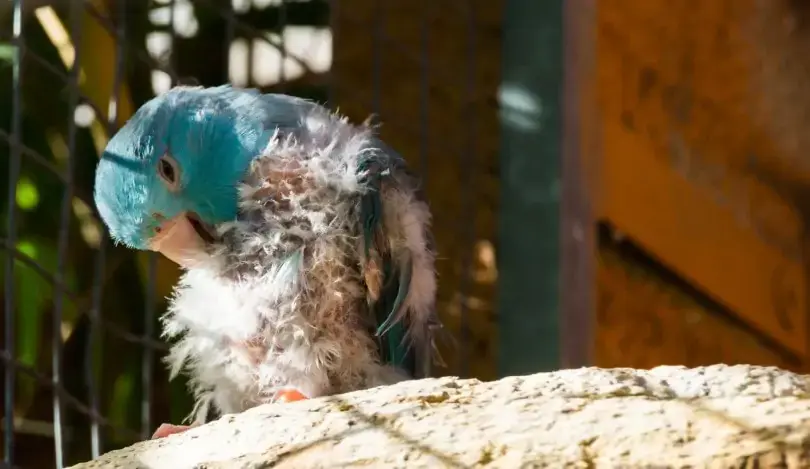How Do You Know If It’s Time to Put Your Bird Down?
- September 13, 2021
- Planning

Unfortunately, there comes a time when we must say goodbye to our beloved pets. As much as we wish they could live forever, we need to prepare ourselves for when their time comes. There are certain signs that can indicate that our pet birds are reaching the end or that they’re in pain and require immediate medical attention. While some pet birds are able to let out a few words here and there, sadly, none of our feathery friends can communicate to us whether they are in pain or not.
As if it wasn’t already hard enough that our beloved pets can’t communicate their feelings or pain to us, most birds have the tendency to hide their pain from their owners. This is due to their particular nature and their survival instincts that make it even harder for us to know if their time is close. This is why it’s so important for pet owners to stay alert and be aware of any signs or symptoms that could indicate their small friend is in pain. By recognizing any of these signs, you could either potentially save your bird friend’s life or at least help minimize their suffering.
Continue reading as we go over the common signs and signals that your beloved bird companion could be reaching the end. We understand that while this is not an easy read, it could help you stay alert to any sudden changes in behavior that could signify an emergency, or simply help you make the most of your precious last few days with your feathery friend.
Common Signs That Your Bird Could Be Dying
Before we dive into the common signs your bird could be dying, we’d like to remind you that no one knows your feathery companion more than you do. If you notice any other changes in behavior that might be of concern that are not listed here, do not hesitate to contact your avian veterinarian as soon as possible. Birds can become ill and pass rather quickly, and therefore, you always want to make sure to reach out immediately to your veterinarian about any sudden changes in behavior.
Below are some of the most typical signs birds will display, indicating they are reaching their end as reported by the majority of bird owners. While these signs tend to be similar across most bird species, we always encourage you to look into the specifics in regards to your bird’s specific breed.
Lethargy
A noticeable sign that something could be wrong with your feathery friend is unusually low energy levels or prolonged sleep times. By nature, birds tend to be very active and social; hence, their constant singing and talking. Birds that lack movement or refuse to leave the bottom of the cage should be watched and monitored. Lethargy in birds can oftentimes indicate depression, pain, or something as severe as they are close to death. Pay close attention to your bird’s energy levels and consult with your veterinarian if they appear to be more fatigued than usual.
Puffed feathers
Birds tend to puff their feathers when they feel relaxed or need sleep, but they can also do this when they’re sick. If you notice your bird’s feathers are puffed up for most of the day, this can be a huge indicator that something could be wrong. This is especially true if you notice they’re constantly bobbing their tails, while puffed up.
Loss of Appetite
Most birds require high amounts of food throughout the day. Due to their rapid metabolism, they tend to have a strong appetite for most of the day. If you notice your bird refuses to eat anything you offer it and hasn’t had anything to drink in days, these are big tale-tellers that their time is near or that they might be in need of urgent help.
Constant Shivering
Birds are able to easily handle and survive the coldest of temperatures. Their feathers and ability to slow down their metabolism help them to easily adapt to any drops in temperature. A bird that constantly appears to be cold and shows signs of shivering or shaking is very likely to be ill or close to death.
Vomiting or Other Related Signs of Stomach Upset
Regurgitation is a natural behavior in birds that looks like vomiting. They tend to do this as an attempt to regurgitate the contents of their esophagus or mouth, disposing of any unwanted matter. In most cases, a regurgitating bird will nod its head and enlarge its neck to bring up any unwanted content. However, if your bird shows signs of illness while it is regurgitating, this is not normal.
You can usually tell the difference between regular regurgitation and vomiting by the behavior presented before and after your bird empties its stomach. Any jerkiness or intense efforts to empty out their stomach could be signs that something is wrong. Also, watch out for the consistency of their regurgitation. Persistent regurgitation can lead to electrolyte imbalance, pneumonia, weight loss, and ultimately death.
Can You Put a Bird Down?
If you notice your beloved pet has become too ill and weak, you have the option to put it to sleep. Birds can be euthanized by the administration of an anesthetic gas that immediately puts it to sleep, and then the same injection that is given to dogs and cats would be administered. Using this method, your bird should not suffer any pain and should be able to experience a peaceful death.
How to Comfort a Dying Bird
As our beloved pet birds can feel as if they become part of our family, it’s not easy by any means to watch them suffer helplessly. Death is an inevitable part of life and our precious feathery friends are unfortunately not exempted from it. As a pet owner, you of course, wish that there was something you could do to comfort your bird companion as it is nearing the end or at least ease some of their pain. Although there is not much that can be done, there are a few things you can do to try to support your beloved pet as their journey comes to an end.
- Help them stay calm by providing a safe and noise-free environment.
- Hold them in a small blanket or in your hands to provide some warmth.
- Keep them in a place with low lighting.
- Try to speak soft words of comfort to them as your voice can be very soothing.
- Try to offer your bird some water to keep them as hydrated as possible.
As you prepare yourself to say goodbye to your beloved feathery friend, we’d like to remind you that you’re not alone and there are plenty of resources available to help you cope. Whether you choose to allow your pet bird to reach its natural end or would prefer to go the route of euthanasia, you can rest assured that they’ll be grateful to have you by their side as they get ready to leave this world. Find peace in the fact that you did everything possible to provide them a joyous and happy life while they lived, and be gentle with yourself as you come to terms with their departure.
Related Articles

What Kind of Behavior Does a Dog Exhibit Before Death?
- August 8, 2021
- Planning

What to Do When Your Pet Passes Away at Home
- July 24, 2021
- Planning

A Basic Guide to Pet Cremation
- June 21, 2021
- Planning

How to Know When to Put Your Dog Down
- June 21, 2021
- Planning

A Guide to Exercises for Older Dogs
- September 27, 2021
- Planning